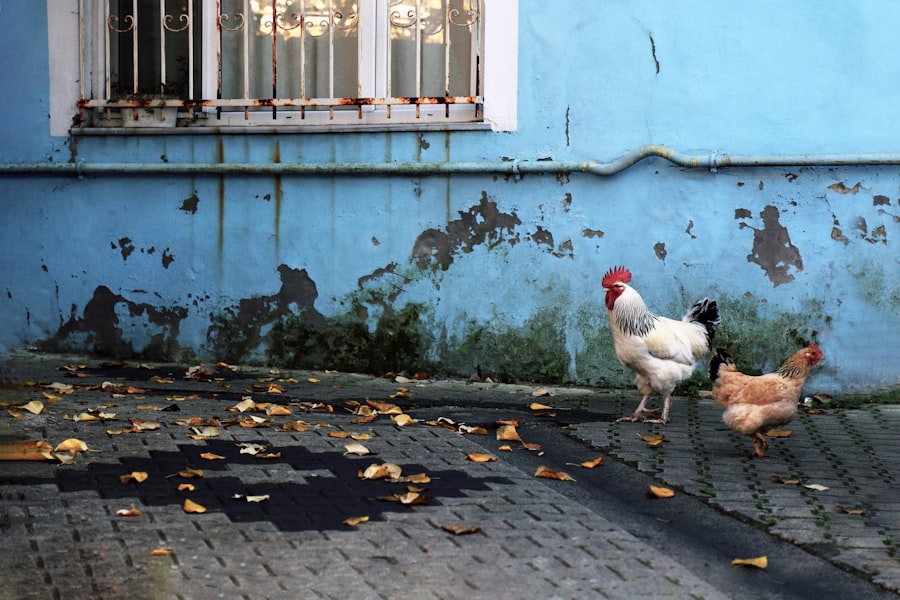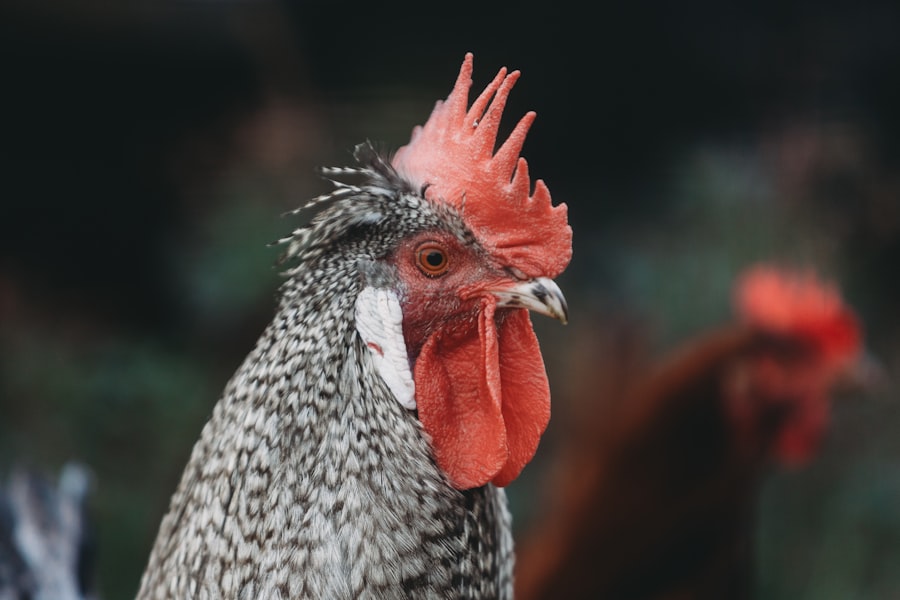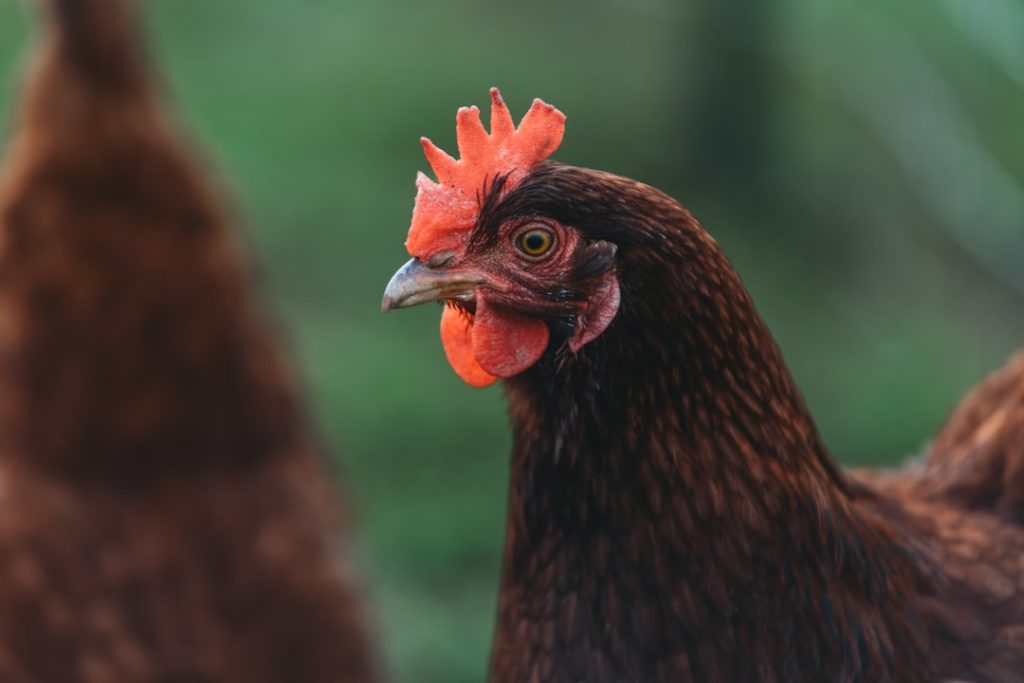Molting is a natural process in which chickens shed their old feathers and grow new ones. This typically occurs once a year, although some chickens may molt more frequently. During molting, chickens may appear scruffy and lose a significant amount of feathers, which can be alarming for chicken owners.
However, it’s important to understand that molting is a normal and necessary part of a chicken’s life cycle. The process of molting is triggered by changes in daylight and temperature, and it is essential for chickens to replace their old feathers with new ones in order to maintain their insulation and protection from the elements. Molting can be a stressful time for chickens, as it requires a significant amount of energy and resources for them to grow new feathers.
During this time, chickens may also experience a decrease in egg production and overall health. It’s important for chicken owners to provide their birds with extra care and attention during the molting process, including ensuring they have access to a balanced diet and a stress-free environment. Understanding the natural process of molting is crucial for chicken owners to distinguish between normal feather loss and potential health issues that may be causing excessive feather loss in their birds.
Table of Contents
- 1 Common reasons for feather loss in chickens
- 2 Health issues that can cause feather loss in chickens
- 3 Environmental factors that may contribute to feather loss in chickens
- 4 Ways to prevent feather loss in chickens
- 5 Treatment options for chickens experiencing feather loss
- 6 Importance of consulting a veterinarian for feather loss in chickens
- 7 FAQs
- 7.1 Why do chickens lose feathers?
- 7.2 What is molting in chickens?
- 7.3 How can stress cause chickens to lose feathers?
- 7.4 What role does nutrition play in feather loss in chickens?
- 7.5 How do parasites contribute to feather loss in chickens?
- 7.6 What can be done to prevent feather loss in chickens?
Key Takeaways
- Molting is a natural process where chickens shed old feathers and grow new ones, typically occurring once a year.
- Common reasons for feather loss in chickens include molting, stress, poor nutrition, parasites, and aggressive pecking from other chickens.
- Health issues such as mites, lice, fungal infections, and diseases like Marek’s disease can cause feather loss in chickens.
- Environmental factors like overcrowding, poor ventilation, and extreme temperatures can contribute to feather loss in chickens.
- Prevent feather loss in chickens by providing a balanced diet, reducing stress, practicing good coop hygiene, and managing pecking behavior.
- Treatment options for feather loss in chickens may include parasite control, dietary supplements, and addressing any underlying health issues.
- It is important to consult a veterinarian for feather loss in chickens to accurately diagnose the cause and develop a proper treatment plan.
Common reasons for feather loss in chickens
Pecking and Bullying
One common reason for feather loss is pecking and bullying within the flock. Chickens are social animals, but they can also be aggressive towards one another, especially if they are overcrowded or stressed. Pecking and bullying can lead to feather loss, skin injuries, and even cannibalism within the flock. It’s essential for chicken owners to monitor their birds for signs of aggression and provide adequate space and enrichment to reduce stress and prevent pecking behavior.
External Parasites
Another common reason for feather loss in chickens is external parasites such as mites and lice. These tiny pests can infest a chicken’s feathers and skin, causing irritation, discomfort, and feather loss. Regular inspection of the flock for signs of parasites, such as scabs, redness, or excessive scratching, is essential for early detection and treatment.
Poor Nutrition
Poor nutrition can also lead to feather loss in chickens. A diet that is deficient in essential nutrients such as protein, vitamins, and minerals can result in poor feather quality and excessive shedding. Providing chickens with a balanced diet that meets their nutritional needs is crucial for maintaining healthy feathers and overall well-being.
Health issues that can cause feather loss in chickens

In addition to external factors such as molting, pecking, and parasites, there are several health issues that can contribute to feather loss in chickens. One common health issue that can cause feather loss is fungal or bacterial infections of the skin. These infections can lead to inflammation, itching, and damage to the feathers, resulting in patchy feather loss.
It’s important for chicken owners to monitor their birds for signs of skin infections, such as redness, swelling, or abnormal discharge, and seek veterinary care for proper diagnosis and treatment. Another health issue that can cause feather loss in chickens is hormonal imbalances. Hormonal changes can occur due to stress, illness, or reproductive issues, leading to abnormal feather growth and shedding.
For example, hens may experience feather loss around the vent area during periods of high egg production or reproductive stress. Monitoring the overall health and behavior of the flock is essential for identifying potential hormonal imbalances and addressing them promptly. Additionally, underlying health conditions such as nutritional deficiencies, liver disease, or thyroid disorders can also contribute to feather loss in chickens.
These conditions can impact the overall health and vitality of the birds, leading to poor feather quality and excessive shedding. Regular health checks and proper nutrition are essential for preventing and addressing these underlying health issues in poultry.
Environmental factors that may contribute to feather loss in chickens
Environmental factors play a significant role in the overall well-being of chickens and can contribute to feather loss if not properly managed. One environmental factor that can impact feather quality is temperature extremes. Both extreme heat and cold can stress chickens and impact their ability to maintain healthy feathers.
In hot weather, chickens may experience heat stress, leading to decreased appetite, dehydration, and poor feather quality. In cold weather, chickens may struggle to maintain their body temperature, diverting energy away from feather growth and maintenance. Another environmental factor that can contribute to feather loss in chickens is poor housing conditions.
Overcrowding, inadequate ventilation, and unsanitary living conditions can lead to stress, disease, and pecking behavior within the flock. It’s important for chicken owners to provide their birds with a clean, spacious, and well-ventilated coop to promote healthy feather growth and minimize the risk of feather loss due to environmental stressors. Furthermore, exposure to toxins and pollutants in the environment can also impact the health of chickens and their feathers.
Pesticides, heavy metals, and other environmental contaminants can lead to skin irritation, inflammation, and poor feather quality in poultry. Providing a clean and safe environment for chickens, free from harmful chemicals and pollutants, is essential for maintaining healthy feathers and overall well-being.
Ways to prevent feather loss in chickens
Preventing feather loss in chickens requires proactive management practices that address both the physical and environmental needs of the birds. One key way to prevent feather loss is by providing a balanced diet that meets the nutritional needs of the flock. A diet rich in high-quality protein, vitamins, minerals, and essential fatty acids is essential for promoting healthy feather growth and maintenance.
Additionally, providing access to fresh water at all times is crucial for overall health and hydration. Another way to prevent feather loss in chickens is by managing the flock’s living environment effectively. Providing adequate space per bird, proper ventilation, clean bedding, and regular coop maintenance are essential for reducing stress and preventing pecking behavior within the flock.
Enriching the environment with perches, dust baths, and other forms of stimulation can also help reduce boredom and aggression among chickens. Furthermore, implementing a regular parasite control program is essential for preventing infestations of mites, lice, and other external parasites that can lead to feather loss. Regularly inspecting the flock for signs of parasites and treating them promptly with appropriate products is crucial for maintaining healthy feathers in poultry.
Treatment options for chickens experiencing feather loss

External Parasites
If the feather loss is due to external parasites such as mites or lice, treating the entire flock with appropriate parasiticides is crucial for eliminating the infestation. Additionally, thoroughly cleaning and disinfecting the coop and nesting areas can help prevent reinfestation.
Pecking Behavior
If pecking behavior within the flock is contributing to feather loss, separating aggressive birds or providing distractions such as hanging treats or toys can help reduce stress and redirect aggressive behavior. Applying anti-peck sprays or ointments to affected areas can also help deter pecking behavior while feathers regrow.
Health Issues
For health issues such as skin infections or hormonal imbalances that are contributing to feather loss, consulting a veterinarian is essential for proper diagnosis and treatment. Depending on the underlying cause, treatment options may include topical or oral medications, dietary supplements, or hormonal therapies to address the specific health issue affecting the birds.
Importance of consulting a veterinarian for feather loss in chickens
Consulting a veterinarian is crucial when addressing feather loss in chickens, especially when it is not related to normal molting or minor pecking behavior within the flock. A veterinarian can conduct a thorough physical examination of the birds to identify any underlying health issues that may be contributing to feather loss. Additionally, they can perform diagnostic tests such as skin scrapings or blood work to further evaluate the health status of the flock.
Furthermore, a veterinarian can provide expert guidance on treatment options tailored to the specific needs of the birds. Whether it’s addressing skin infections, hormonal imbalances, or nutritional deficiencies, a veterinarian can recommend appropriate medications, dietary adjustments, or management practices to promote healthy feather growth and overall well-being in poultry. In some cases, consulting a veterinarian may also be necessary for legal reasons if certain medications or treatments require a prescription or professional administration.
Additionally, veterinarians can provide valuable advice on preventive care practices to minimize the risk of future feather loss in chickens. Overall, consulting a veterinarian when addressing feather loss in chickens is essential for ensuring the health and welfare of the birds. Veterinarians play a critical role in diagnosing underlying health issues, providing effective treatment options, and promoting proactive management practices that support healthy feathers and overall well-being in poultry.
If you’re struggling with chickens keep losing feathers, you may want to consider upgrading your chicken coop to provide a more comfortable and stress-free environment for your birds. Check out this article on chicken coop design ideas for inspiration on how to create a cozy and secure space for your feathered friends. A well-designed coop can help reduce feather loss and improve the overall health and well-being of your flock.
FAQs
Why do chickens lose feathers?
Chickens can lose feathers for a variety of reasons, including molting, stress, poor nutrition, parasites, or pecking from other chickens.
What is molting in chickens?
Molting is a natural process where chickens shed their old feathers and grow new ones. This typically occurs once a year and can cause chickens to appear patchy or bald in certain areas.
How can stress cause chickens to lose feathers?
Stress can lead to feather loss in chickens due to factors such as overcrowding, changes in environment, or predator threats. This can result in a condition known as “stress molting.”
What role does nutrition play in feather loss in chickens?
Poor nutrition, specifically a lack of essential vitamins and minerals, can lead to feather loss in chickens. A balanced diet is crucial for maintaining healthy feathers.
How do parasites contribute to feather loss in chickens?
Parasites such as mites and lice can infest a chicken’s feathers, causing irritation and leading to excessive preening and feather loss. Regular parasite control is important for maintaining healthy feathers.
What can be done to prevent feather loss in chickens?
To prevent feather loss in chickens, it’s important to provide a balanced diet, a clean and stress-free environment, regular parasite control, and adequate space for the birds to avoid pecking and aggression. Regular health checks and proper grooming can also help maintain healthy feathers.
Meet Walter, the feathered-friend fanatic of Florida! Nestled in the sunshine state, Walter struts through life with his feathered companions, clucking his way to happiness. With a coop that’s fancier than a five-star hotel, he’s the Don Juan of the chicken world. When he’s not teaching his hens to do the cha-cha, you’ll find him in a heated debate with his prized rooster, Sir Clucks-a-Lot. Walter’s poultry passion is no yolk; he’s the sunny-side-up guy you never knew you needed in your flock of friends!







